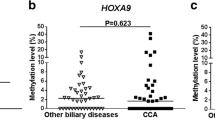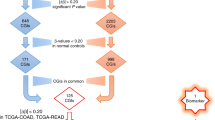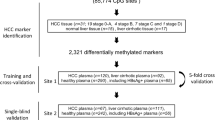Abstract
Cholangiocarcinoma (CCA) is a malignancy of the bile duct epithelium which is caused by liver fluke infection. The clinical symptoms of CCA were revealed as the disease progresses to advanced stage. Thus, specific diagnostic biomarkers are important for this fatal disease. We applied methylation-sensitive high-resolution melting (MS-HRM) to quantify DNA methylation levels of opioid binding protein/cell adhesion molecule-like gene (OPCML) and Secreted frizzled-related protein 1 (SFRP1) in 73 primary CCA and 10 adjacent normal tissues and evaluated the sensitivity, specificity, and accuracy of the assay. The median methylation level of OPCML in CCA was 38.7 % (ranged from 0 to 82.2 %) and of SFRP1 was 31.5 % (ranged from 0 to 86.2 %). Methylation cutoff values of OPCML and SFRP1 derived from adjacent normal tissue were 6.90 and 10.44 %, respectively. With these cutoff values, the area under curve (AUC) of OPCML was 0.932 (95 % CI 0.878–0.986) and of SFRP1 was 0.951 (95 % CI 0.905–0.996). The sensitivity, specificity, and accuracy of OPCML were 89.04, 100, and 90.36 %, respectively, and of SFRP1 were 83.56, 100, and 85.54 %, respectively. In conclusion, the DNA methylation levels of OPCML and SFRP1 could be potential biomarkers for diagnosis of CCA with high specificity, sensitivity, and accuracy, in particular for biopsy specimens. Further validation in noninvasive samples such as serum or plasma is warranted for clinical applicability, especially as early diagnostic biomarkers.



Similar content being viewed by others
References
Gatto M, Bragazzi MC, Semeraro R, Napoli C, Gentile R, Torrice A, et al. Cholangiocarcinoma: update and future perspectives. Dig Liver Dis. 2010;42(4):253–60.
Mosconi S, Beretta GD, Labianca R, Zampino MG, Gatta G, Heinemann V. Cholangiocarcinoma. Crit Rev Oncol Hematol. 2009;69(3):259–70.
Sripa B, Brindley PJ, Mulvenna J, Laha T, Smout MJ, Mairiang E, et al. The tumorigenic liver fluke Opisthorchis viverrini–multiple pathways to cancer. Trends Parasitol. 2012;28(10):395–407.
Sripa B, Bethony JM, Sithithaworn P, Kaewkes S, Mairiang E, Loukas A, et al. Opisthorchiasis and Opisthorchis-associated cholangiocarcinoma in Thailand and Laos. Acta Trop. 2010;120 Suppl 1:S158–68.
Shin HR, Oh JK, Masuyer E, Curado MP, Bouvard V, Fang YY, et al. Epidemiology of cholangiocarcinoma: an update focusing on risk factors. Cancer Sci. 2010;101(3):579–85.
Sawanyawisuth K. Genes and cholangiocarcinoma. Southeast Asian J Trop Med Public Health. 2009;40(4):701–12.
Gatto M, Alvaro D. New insights on cholangiocarcinoma. World J Gastrointest Oncol. 2010;1(1):12–22.
Taby R, Issa JP. Cancer epigenetics. CA Cancer J Clin. 2010;60(6):376–92.
Duffy MJ, Napieralski R, Martens JW, Span PN, Spyratos F, Sweep FC, et al. Methylated genes as new cancer biomarkers. Eur J Cancer. 2009;45(3):335–46.
Duarte-Pereira S, Paiva F, Costa VL, Ramalho-Carvalho J, Savva-Bordalo J, Rodrigues A, et al. Prognostic value of opioid binding protein/cell adhesion molecule-like promoter methylation in bladder carcinoma. Eur J Cancer. 2011;47(7):1106–14.
Cui Y, Ying Y, van Hasselt A, Ng KM, Yu J, Zhang Q, et al. OPCML is a broad tumor suppressor for multiple carcinomas and lymphomas with frequently epigenetic inactivation. PLoS One. 2008;3(8):e2990.
Bombardelli L, Cavallaro U. Immunoglobulin-like cell adhesion molecules: novel signaling players in epithelial ovarian cancer. Int J Biochem Cell Biol. 2010;42(5):590–4.
Sellar GC, Watt KP, Rabiasz GJ, Stronach EA, Li L, Miller EP, et al. OPCML at 11q25 is epigenetically inactivated and has tumor-suppressor function in epithelial ovarian cancer. Nat Genet. 2003;34(3):337–43.
Lu CY, Hsieh SY, Lu YJ, Wu CS, Chen LC, Lo SJ, et al. Aberrant DNA methylation profile and frequent methylation of KLK10 and OXGR1 genes in hepatocellular carcinoma. Genes Chromosom Cancer. 2009;48(12):1057–68.
McKie AB, Vaughan S, Zanini E, Okon IS, Louis L, de Sousa C, et al. The OPCML tumor suppressor functions as a cell surface repressor-adaptor, negatively regulating receptor tyrosine kinases in epithelial ovarian cancer. Cancer Discov. 2012;2(2):156–71.
Zhang Y, Wang R, Song H, Huang G, Yi J, Zheng Y, et al. Methylation of multiple genes as a candidate biomarker in non-small cell lung cancer. Cancer Lett. 2011;303(1):21–8.
Esteve P, Bovolenta P. The advantages and disadvantages of sfrp1 and sfrp2 expression in pathological events. Tohoku J Exp Med. 2010;221(1):11–7.
Baylin SB, Ohm JE. Epigenetic gene silencing in cancer - a mechanism for early oncogenic pathway addiction? Nat Rev Cancer. 2006;6(2):107–16.
Klarmann GJ, Decker A, Farrar WL. Epigenetic gene silencing in the Wnt pathway in breast cancer. Epigenetics. 2008;3(2):59–63.
Chung MT, Sytwu HK, Yan MD, Shih YL, Chang CC, Yu MH, et al. Promoter methylation of SFRPs gene family in cervical cancer. Gynecol Oncol. 2009;112(2):301–6.
Jiang GX, Liu W, Cui YF, Zhong XY, Tai S, Wang ZD, et al. Reconstitution of secreted frizzled-related protein 1 suppresses tumor growth and lung metastasis in an orthotopic model of hepatocellular carcinoma. Dig Dis Sci. 2010;55(10):2838–43.
Liu JB, Qiang FL, Dong J, Cai J, Zhou SH, Shi MX, et al. Plasma DNA methylation of Wnt antagonists predicts recurrence of esophageal squamous cell carcinoma. World J Gastroenterol. 2011;17(44):4917–21.
Rawson JB, Manno M, Mrkonjic M, Daftary D, Dicks E, Buchanan DD, et al. Promoter methylation of Wnt antagonists DKK1 and SFRP1 is associated with opposing tumor subtypes in two large populations of colorectal cancer patients. Carcinogenesis. 2011;32(5):741–7.
Saini S, Liu J, Yamamura S, Majid S, Kawakami K, Hirata H, et al. Functional significance of secreted Frizzled-related protein 1 in metastatic renal cell carcinomas. Cancer Res. 2009;69(17):6815–22.
Shen JZ, Xu CB, Fu HY, Wu DS, Zhou HR, Fan LP. Methylation of secreted frizzled related protein gene in acute leukemia patients in China. Asian Pac J Cancer Prev. 2011;12(10):2617–21.
Uhm KO, Lee ES, Lee YM, Kim HS, Park YN, Park SH. Aberrant promoter CpG islands methylation of tumor suppressor genes in cholangiocarcinoma. Oncol Res. 2008;17(4):151–7.
Sriraksa R, Zeller C, El-Bahrawy MA, Dai W, Daduang J, Jearanaikoon P, et al. CpG-island methylation study of liver fluke-related cholangiocarcinoma. Br J Cancer. 2011;104(8):1313–8.
Wojdacz TK, Dobrovic A. Methylation-sensitive high resolution melting (MS-HRM): a new approach for sensitive and high-throughput assessment of methylation. Nucleic Acids Res. 2007;35(6):e41.
Amornpisutt R, Sriraksa R, Limpaiboon T. Validation of methylation-sensitive high resolution melting for the detection of DNA methylation in cholangiocarcinoma. Clin Biochem. 2012;45(13–14):1092–4.
Sriraksa R, Chaopatchayakul P, Jearanaikoon P, Leelayuwat C, Limpaiboon T. Verification of complete bisulfite modification using Calponin-specific primer sets. Clin Biochem. 2010;43(4–5):528–30.
Harden SV, Guo Z, Epstein JI, Sidransky D. Quantitative GSTP1 methylation clearly distinguishes benign prostatic tissue and limited prostate adenocarcinoma. J Urol. 2003;169(3):1138–42.
Watanabe Y, Kim HS, Castoro RJ, Chung W, Estecio MR, Kondo K, et al. Sensitive and specific detection of early gastric cancer with DNA methylation analysis of gastric washes. Gastroenterology. 2009;136(7):2149–58.
Renard I, Joniau S, van Cleynenbreugel B, Collette C, Naome C, Vlassenbroeck I, et al. Identification and validation of the methylated TWIST1 and NID2 genes through real-time methylation-specific polymerase chain reaction assays for the noninvasive detection of primary bladder cancer in urine samples. Eur Urol. 2010;58(1):96–104.
Acknowledgments
This work was supported by Khon Kaen University Research Affairs under the National Research Council of Thailand. R.A. was granted by the Centre for Research and Development of Medical Diagnostic Laboratories (CMDL), Faculty of Associated Medical Sciences; and Graduate School, Khon Kaen University. We thank the Liver Fluke and Cholangiocarcinoma Research Center for clinical specimens and data.
Conflicts of interest
None
Author information
Authors and Affiliations
Corresponding author
Rights and permissions
About this article
Cite this article
Amornpisutt, R., Proungvitaya, S., Jearanaikoon, P. et al. DNA methylation level of OPCML and SFRP1: a potential diagnostic biomarker of cholangiocarcinoma. Tumor Biol. 36, 4973–4978 (2015). https://doi.org/10.1007/s13277-015-3147-2
Received:
Accepted:
Published:
Issue Date:
DOI: https://doi.org/10.1007/s13277-015-3147-2




